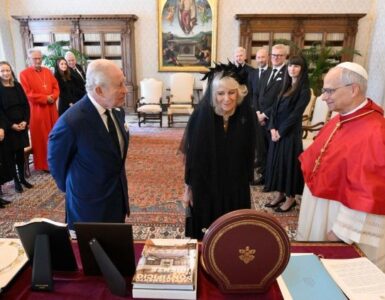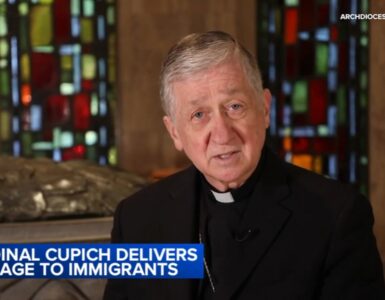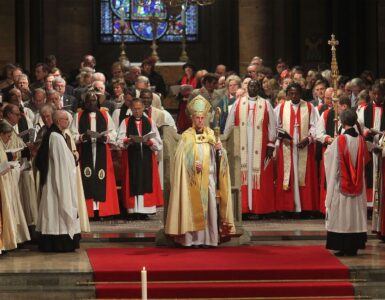In the aftermath of Bishop Barron’s interview with Tucker Carlson, many commentators have already scrutinized nearly every word of this interview, particularly criticizing Bishop Barron’s stumbling over the St. Michael’s prayer and not emphasizing the doctrine of hell. Personally, I don’t think much can be read into this, and one can criticize the bishop for many things, but having a lacking prayer life is not one of them, and I don’t blame the Bishop for not making the entire interview about the massa damnata. In many ways, I think Bishop Barron did a good job presenting many aspects of Catholicism to Tucker Carlson in this interview.
However, I do think some of the surrounding conversation about Bishop Barron’s ideas on hell in general is especially relevant for the ongoing debate about how to view the Second Vatican Council, especially seen in a now re-popularized clip from an interview of Bishop Barron with Ben Shapiro.
In the more conservative and traditional circles seeking to harmonize all of the Second Vatican Council and the subsequent post-conciliar magisterium with earlier teachings, you’ll often hear that the modern perspectives on salvation and ecumenism simply need a clearer presentation or a freshly designed frame.
This position typically begins with selectively citing Garrigou-Lagrange’s more optimistic points on salvation, saying that many non-Catholic Christians are in fact saved, or referencing the First Vatican Council’s affirmation of man’s ability to know God by natural reason.

From here, proponents can argue that current ecumenical positions are merely reiterations of these earlier ideas from orthodox thinkers and councils, and that the Council is merely providing exceedingly rare exceptions of salvation found outside of the visible Church. The problem seems to be solved, the Church should be radical in her practical missionary zeal, and the Council is saved!
However, this position inevitably runs into a serious contradiction. To appear traditionally minded, these advocates insist on emphasizing the necessity of Christ while simultaneously affirming salvation for those outside the visible Church. The people who set the tone for that are the bishops, as they are the visible representatives of the Magisterium. When we look at the clip of Bishop Barron when asked by Ben Shapiro, if he, a Jew, can be saved by merely following his own conscience, Bishop Barron affirmed that he indeed can and that this is the position of the Second Vatican Council.
I think we can see a problem similar to Aristotle’s critique in the Physics, where he did not condemn his predecessors because their arguments were internally illogical, but because their conclusions contradicted evident reality (Saying that change didn’t exist, or that there were not stable essences)
After reviewing Church history and the Gospel itself, no one can walk away from Our Lord’s words or the missionary example of our Saints with the conclusion that we should say to non-Christians, particularly Jews, “Follow your conscience and you’ll be fine, though Christ is the more perfect way.” One might accept that those who die in invincible ignorance are excused from the guilt of heresy or schism, and that God can work outside of the normal bounds of the sacraments to bring them into his grace, but the response of Bishop Barron goes well beyond this and into absurdity. Even if one disagrees with Bishop Barron—believing him overly liberal or unfaithful to Vatican II—it’s crucial to note his assertion: “This is what the Second Vatican Council says.” And he is right, the post-conciliar Magisterium, clearly seen even in the pontificate of John Paul II, whose general audience of May 31st, 1995, teaches that the Council was getting at exactly what Bishop Barron says. Bishop Barron is not one step out of line from the teaching of John Paul II.
This leaves us with an uncomfortable reality, where if stuck in this paradigm, there seems to be no way out: the so-called conservative “hermeneutic of continuity” exists only in the minds of its proponents, those who wish desperately to reconcile Vatican II with historical Catholic missionary zeal. Yet, practically, it doesn’t exist at all, it’s *only* in the mind of laymen and not in the mind of the Church. On the other hand, those who are visible representatives of the Council undermine the point of the hermeneutic of continuity itself and contradict the evident spirit of the pre-conciliar Catholic Church. We are left facing an absurd scenario in which Vatican II’s defenders universally proclaim its doctrinal orthodoxy and can therefore feel superior to the traditionalists not in ‘full communion’, yet these defenders cannot agree on what precisely the Council teaches or its practical application.
But perhaps there is a way out, similar to how Aristotle solved the problem of his day by saying we are in a too-limited paradigm, thereby introducing potency and act. Similarly, today, the only sensible way to solve this problem is to say that we are in a too-limited paradigm today, and there is no need to reconcile the Council with the past higher-weighted teachings if it is evidently not so. This conversation must be had at some point, but in the meantime, the absurdity will continue, and the “privileged way” will continue to be one path among many.
For more articles like this subscribe to Catholic Family News!
E-Edition+Premium Video Content





